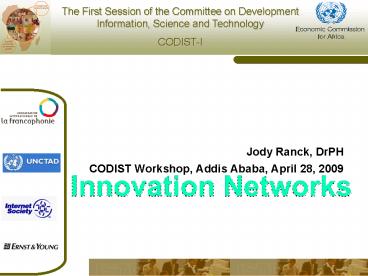Innovation Networks - PowerPoint PPT Presentation
1 / 76
Title: Innovation Networks
1
Innovation Networks
- Jody Ranck, DrPH
- CODIST Workshop, Addis Ababa, April 28, 2009
2
Introduction to Social Media
- What was web 1.0?
- What is driving web 2.0?
- What are the tools available?
- What types of problems are being solved?
- Challenges
3
Intro to Social Media
- Web 1.0
4
Intro to Social Media web 2.0
5
Architecture of Participation
- User-generated content
- Self-publishing
- Peer-to-peer interactions
- Many-to-many
- Swarm behavior/crowdsourcing
- Cooperation
6
Blogs
7
Blogs
8
Wikis
9
Science Wikis
10
Social Networks
11
Social Networks
12
Whats Driving Social Media?
- Rise of participatory culture
- DIY
- Lower transaction costs than MSM
- Finding like-minded people
- Distrust of hierarchy, traditional institutions
- Cooperation
- Too much knowledge in silos
- Disciplines disciplining knowledge
13
Tools of Cooperation
- RSS
- Micro-blogging
- Social Tagging
- Podcasting
- Solution finding vs. Problem Solving
14
Really Simple Syndication (RSS)
15
RSS
- Broadcasting
- Updating
- Sharing
16
Feeds and Aggregators
- Google Reader, NewsGator, AfriGator
- Time Saver
- Personalized Newspapers
- Social Filters, eg. Friend Feed
17
Aggregator
18
Social Tagging
19
Tag Clouds
20
Social Tagging
- Folksonomies
- Sharing Research/developments
- Can make feeds to aggregators
21
Micro-blogging
22
microblogging
23
microblogging
24
Social Networking
- Finding like-minded people
- Finding out who is doing what
- Where are people going online?
- How are they building communities?
- Sharing ideas and interests
- Organizing collective action
- Open policy-making/government 2.0
25
Social Networking
26
Social Networking
27
Social Networking
28
Social Networking
29
Social Networking
30
How we think about innovation is changing
31
Open Innovation
32
New Models for Innovating
User Led Innovation
Open Innovation
Peer-to-peer
Co-creation
33
Open Innovation/Ideation
34
Open Innovation
35
Open Innovation
36
Open Innovation
37
Co-created science
38
Co-created science
39
Open Science
40
Part 2 Open Science
Science 1.0
41
Open Science
Science 2.0
Source MichaelNielsen.org
42
Science 2.0 What is it?
- Open Access
- Social Filters
- Open/transparent experimentation
- New Media Learning Tools
- New Scientific Commons
- Swarming for Innovation and collaboration/cooperat
ion
43
Open Access
44
Open Access
45
Open Access
46
Open Access
47
Open Access-Search
48
Open Access-Search
49
Open Access/Data
50
Tools of Coop. in Science
51
Tools of Cooperation
52
Tools of Cooperation
53
Tools of Cooperation
54
Open Data
55
Open Notebook Science
56
Open science connectivity
More info on open source science here
http//usefulchem.wikispaces.com
57
UsefulChem in Second Life
58
Visualization Experimentation
59
Visualization and Experimentation
60
Open Protocols
61
Science Networks
62
Science Networks
63
Science Networks
64
Science Networks South to South
65
Networks across bottlenecks
66
Innovation Platforms
67
New Science Commons
68
Collaboratories
69
Open Innovation with Africa
70
Building Communities of Practice for Innovation
- Which scientific communities? Do they overlap?
- What are their priority needs around
collaboration? Innovation? - Which groups are the most important?
- What would success look like? Who decides?
- Who will be the community gardner?
- Resources? Outreach?
71
Barriers
- CIO policies often prohibit social
networking/cooperation tools - Interfaces may need to be adapted to African
bandwidth - Culture of science is often closed
- Can they be taken into the field, ie. mobile
72
Why people participate?
- Recognition
- Sense of Community-new relationships
- Decreased isolation
- Feedback on work/more publishing
- Self-publishing
- Find Solutions
73
Benefits of Innovation Networks
- Agility
- Extract knowledge from the edges/external
- Uncover hidden practices/insights
- Synergies with other institutions
- Swarm behavior
- Reduce costs
- Locate experts
74
Components of Networks
- Trust
- Open Access to everyone
- Transparency
- Learning Network
- Easy to contribute-SIMPLICITY
- Rewards for contributing
- Flexible platforms for changing needs
- Content is king
- Connections to offline activities
75
What Would Askia 2.0 look like?
- What kinds of communities?
- Which problems (or types) could be addressed?
- What tools would be most useful?
- Science commons for Africa?
- What incentives to participate?
- Open innovation platform?
76
- What are the most pressing problems you think we
could use this tool in Africa ? - Who would be the scientific communities that
could get involved? - What would the platform do?
- What would the platform look like?































